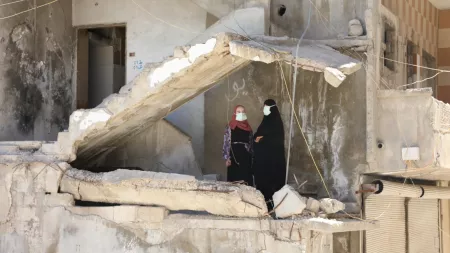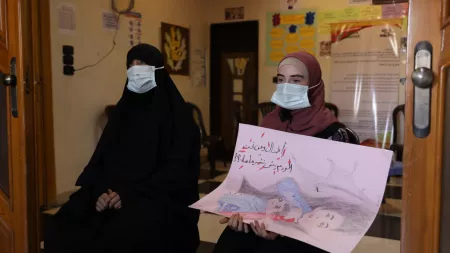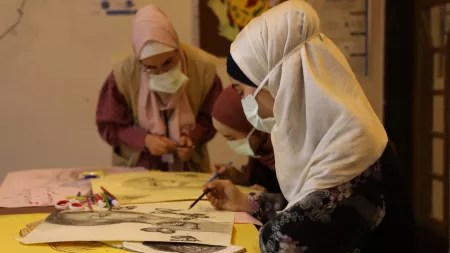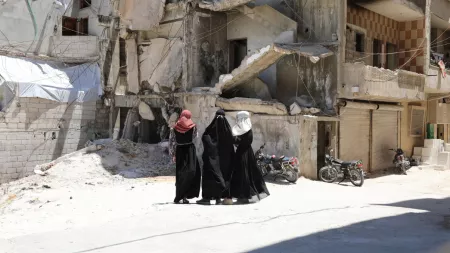Fatma*, a 48-year-old mother of six children, three boys and three girls, is one of the thousands of people who lost their homes to the devastating earthquakes of February 6, in Northwest Syria. Six months after the earthquakes, Fatma and her 9-year-old daughter, Aisha*, recall the first moments of the natural disaster and share with us how their lives changed within seconds.
“During the first earthquake, on February 6, we were sleeping. I had fallen asleep in the same room as my children. The ground started slowly shaking. The first two seconds, I thought to not wake them up so that they are not afraid, but immediately the shaking intensified. The sound of the earthquake was thunderous, very loud, and very deep. I thought to myself that this was the horror of the Day of Judgement. At this moment, the building just across from our house was collapsing, causing an extremely loud noise that became one with the earthquake deep sound. I was in shock.
My children were terrified, and we all started running, stumbling, and falling over each other rushing to get out. Everything around us was falling apart. My youngest child jumped on me and while crying, he screamed ‘Please don't leave me’, and at the same time I was thinking about my eldest son who lived in a separate house. We ran out of the building as fast as we could and I can no longer remember what happened immediately after that”, says Fatma, explaining that thankfully no member of her family was physically harmed during the earthquake, but they are still struggling to heal the invisible wounds that this traumatic experience has left on them.
"We didn’t bring anything with us, but that did not matter. All I cared about was the safety of my children,"Fatma says.
“The first day after the earthquake, we didn't know what to do. My husband and my eldest son went back to the house to retrieve whatever they could from our partly collapsed house, such as a couple of mattresses, and some food. We set up a tent and stayed there for a while.
My children were not afraid in the tent as they knew there was no danger of having stones falling over us, but their mental health was severely affected. They are very sensitive to every single sound and in the beginning, immediately after the earthquakes, they would often run when they were scared. They do not want to go back home. My 9-year-old son clings on to me constantly and begs me not to leave him alone”, says Fatma.
With nothing but the few items and clothes they had managed to gather from their house, the family had to move to a camp for internally displaced people within a few days after February 6 and had to stay there since they were notified that their house was not safe and would soon be demolished due to the extensive damage caused by the earthquake.

Fatma was extremely worried about her children’s mental health and had no hope she could find any support for them in the camp. But this is where she met Syria Relief, a local organization that, in collaboration with CARE, provides psychological first aid and mental health support to boys, girls, and parents, through one-on-one consultations and group sessions. Fatma did not waste time and registered Aisha* and her older sister, Sarah, to the group sessions immediately, despite her initial doubts these would actually help. The words of her daughter Aisha, are really telling of the progress she has made.
“My mental state was shattered after the earthquakes. I feared any loud sound and would immediately run away, thinking it was another aftershock. When we left our house, I felt the pain of separation: I was deeply affected and broken. But in the camp, when I attended the sessions at the Syria Relief Center, after my friends encouraged me to go, I started getting better.
I used to draw before, but I never showed my artwork to anyone. After these sessions, I started sharing my drawings with others. I drew this picture a while ago to express the feelings of pain I experienced because of the earthquake”, says Aisha, holding one of the drawings she made during a group therapy session for children, which aimed at helping them understand and express their emotions after the traumatic experience of the earthquake and everything that followed.

Her drawing is a representation of a 9-year-old girl, Sham, and her brother, who were trapped under the rubble for 40 hours before being rescued. On the top left Aisha writes "Children under debris, what can be said?!". “The pain I felt lasted for a few minutes, but these children endured pain for days, some others for longer. This drawing describes my feelings and the pain I felt in relation to the earthquake. I placed the drawing in the Syria Relief Center and displayed it to the community. I felt relieved and stronger. Everyone who saw the drawing was asking 'Did you draw this?' and I would say, 'Yes, I drew it. I draw!'”
“After Syria Relief helped me, I started writing down my hopes and what I want to do in the future. I want to become a pediatrician to treat children in need. After the earthquakes, I wished I was a doctor so I could treat the affected children. I would support them emotionally and help them build their confidence back, like I did, thanks to everyone who stood by me and supported me in being able to dream again” says Aisha.
"Previously, I did not believe in the effectiveness of protection or psychosocial support projects for children. But when I saw my daughters getting better, I changed my mind,"Fatma expresses.
“My daughter was devastated, but after these sessions her spirits were lifted, and her self-confidence grew. Syria Relief provides sessions on first aid and advice on what to do during an earthquake, how to help our children, how to move and where to go in such extreme circumstances and they offer psychosocial support. This support proved to be truly beneficial, and I want my children to be persistent and continue attending these activities,” says Fatma, looking at some of the drawings that Aisha and Sarah have done during the past few months.
“As a result, my daughters are not only stronger but also more motivated. They have developed a passion for drawing and display their creative side with art crafts and drawing, through which they express themselves. Their self-confidence has improved significantly, and they have become more courageous.”

However, the hardships of Fatma and her family following the earthquakes have not come to an end, and they are extremely worried about their future since they have lost both their house and their income.
“Our source of income was our olive trees. When the earthquake happened, we had just finished pressing the olives to extract the oil at the press. This is now gone. Everything changed within a few seconds. We are farmers, and we mainly relied on our olive groves to secure our income. Now I try to work in whatever job opportunity comes up to support my family financially, but there are not enough jobs.
I just hope that our house and all the buildings that collapsed will be repaired, so that we can return to our homes, and we are not forced to stay in other people's houses or camps anymore. As for my children, I really hope that the activities carried out by Syria Relief will continue because this is the only reason they are getting better”, ends Fatma.
*Names have been changed to protect identity
CARE and partners' response
CARE and its partner Syria Relief offer protection services to women and children in Northwest Syria under a multi-country initiative, Tipping Point, with funding from the Sandberg & Goldberg Foundation. CARE places the specific needs and rights of women and girls at the heart of all we do.
